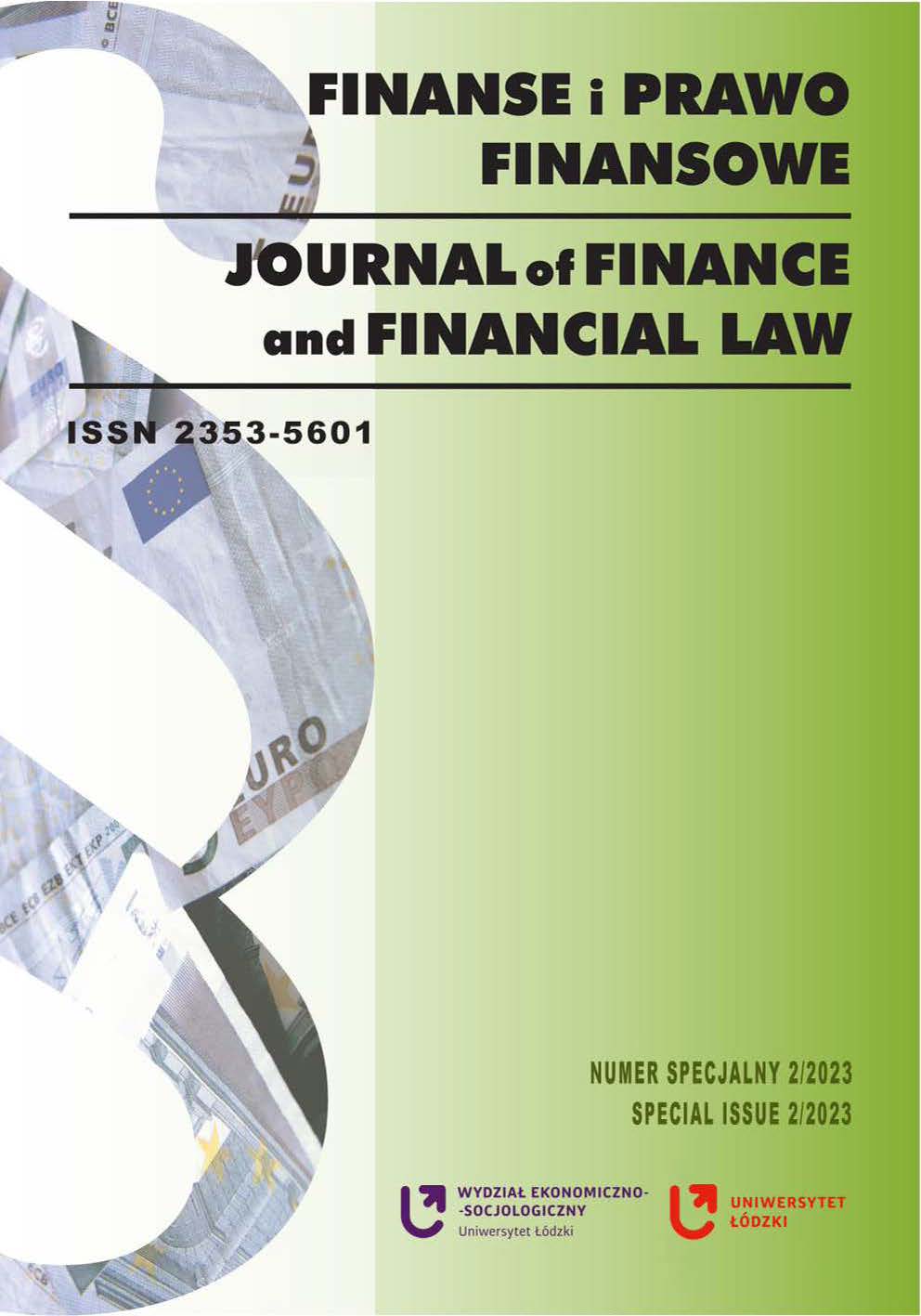Systemically Important Banks – Risk Transfer in the Euro Area
DOI:
https://doi.org/10.18778/2391-6478.S2.2023.03Keywords:
systemically important banks, systemic risk, the euro area, SRISK, risk transferAbstract
The purpose of the article/hypothesis. The main aim of this article is to assess the direction and scale of risk transfer via systemically important banks in the euro area. This paper also critically analyses and proposes practical applications of supervisory and complex measures of SIBs identification.
Methodology. The impact of systemic risk transfer via O-SIBs on the home and host countries was examined using the supervisory measure of an individual bank’s contribution in the national systemic risk. Additionally, the SRISK model was used.
Results of the research. The conducted research has shown that the nature of risk transfer is potentially unidirectional, i.e., from the ‘old EU’ countries to the other countries in the same group or to the ‘new EU’ states. Also, three other SIBs have been found to pose a greater threat to the national banking system than their parent entities do in their home countries. Moreover, it has been demonstrated that in three countries, the aggregate risk contribution of the local O-SIBs – being subsidiaries of O-SIBs from other Eurozone countries – exceeds 25%.
Downloads
References
Adrian, T. (2016). Brunnermeier M. K., CoVaR, American Economic Review, no. 106(7), pp. 1705–1745, https://doi.org/10.1257/aer.20120555
Google Scholar
DOI: https://doi.org/10.1257/aer.20120555
Basel Committee on Banking Supervision (2018). Global systemically important banks: revised assessment methodology and the higher loss absorbency requirement.
Google Scholar
Brownlees, Ch. and Engle, R. (2012). Volatility, Correlation and Tails for Systemic Risk Measurement. NYU-Stern Working Paper, October, https://doi.org/10.2139/ssrn.1611229
Google Scholar
DOI: https://doi.org/10.2139/ssrn.1611229
Brownlees, Ch. and Engle, R. (2017). SRISK: A Conditional Capital Shortfall Measure of Systemic Risk. The Review of Financial Studies, no. 30(1), pp. 48–79, https://doi.org/10.1093/rfs/hhw060
Google Scholar
DOI: https://doi.org/10.1093/rfs/hhw060
Cai, J., Eidam, F., Saunders, A. and Steffen, S. (2018). Syndication, interconnectedness, and systemic risk. Journal of Financial Stability, no. 34, pp. 105–120, https://doi.org/10.1016/j.jfs.2017.12.005
Google Scholar
DOI: https://doi.org/10.1016/j.jfs.2017.12.005
Directive 2013/36/EU of the European Parliament and of the Council of 26 June 2013 on access to the activity of credit institutions and amending Directive 2002/87/EC and repealing Directives 2006/48/EC and 2006/49/EC (OJ L 176, 27.6.2013, 338–436).
Google Scholar
European Banking Authority (2014). Guidelines on the criteria to determine the conditions of application of Article 131(3) of Directive 2013/36/EU (CRD) in relation to the assessment of other systemically important institutions (O-SIIs) (EBA/GL/2014/10).
Google Scholar
Foglia, M., Pacelli, V. and Wang, G.-J. (2023). Systemic risk propagation in the Eurozone: A multilayer network approach. International Review of Economics and Finance, no. 88, pp. 332–346, https://doi.org/10.1016/j.iref.2023.06.035
Google Scholar
DOI: https://doi.org/10.1016/j.iref.2023.06.035
Górnicka, L.A. and Zoican, M.A. (2016). Too-international-to-fail? Supranational bank resolution and market discipline. Journal of Banking & Finance, no. 65, pp. 41–58, https://doi.org/10.1016/j.jbankfin.2016.01.005
Google Scholar
DOI: https://doi.org/10.1016/j.jbankfin.2016.01.005
Huang, X., Zhou, H. and Zhu, H. (2009). A Framework for Assessing the Systemic Risk of Major Financial Institutions. Bank for International Settlements – BIS Working Papers No. 281.
Google Scholar
DOI: https://doi.org/10.17016/FEDS.2009.37
Koleśnik, J. (2019). Bankowe ryzyko systemowe – źródła i instrumenty redukcji. Warszawa: Difin.
Google Scholar
Koleśnik, J. and Dąbkowska, A. (2021). Methods for alleviating the problem of Too big to fail in Germany. Journal of Banking Regulation, no. 22(1), pp. 11–23, https://doi.org/10.1057/s41261-020-00125-1
Google Scholar
DOI: https://doi.org/10.1057/s41261-020-00125-1
Kozińska, M. (2018). Przymusowa restrukturyzacja banków w Unii Europejskiej. Warszawa: CeDeWu.
Google Scholar
Li, Y., Chen, S., Goodell, J.W., Yue, D. and Liu X. (2023). Sectoral spillovers and systemic risks: Evidence from China. Finance Research Letters, no. 55, 104018, https://doi.org/10.1016/j.frl.2023.104018
Google Scholar
DOI: https://doi.org/10.1016/j.frl.2023.104018
Liikanen, E. (2012). Final report. High-level Expert group on reforming the structure of the EU banking sector.
Google Scholar
Lombardi, D. and Moschella, M. (2016). Domestic preferences and European banking supervision: Germany, Italy and the Single Supervisory Mechanism. West European Politics, no. 39(3), pp. 462–482, https://doi.org/10.1080/01402382.2016.1143242
Google Scholar
DOI: https://doi.org/10.1080/01402382.2016.1143242
Mishkin, F.S. (2001). Financial policies and the prevention of financial crises in emerging market countries. NBER Working Paper Series No. 8087.
Google Scholar
DOI: https://doi.org/10.3386/w8087
Narayan, S., Kumar, D. and Bouri E. (2023). Systemically important financial institutions and drivers of systemic risk: Evidence from India. Pacific Basin Finance Journal, no. 82, pp. 102–155, https://doi.org/10.1016/j.pacfin.2023.102155
Google Scholar
DOI: https://doi.org/10.1016/j.pacfin.2023.102155
Yan, C., Ding, Y., Liu, W., Liu, X. and Liu J. (2023). Multilayer interbank networks and systemic risk propagation: Evidence from China. Physica A: Statistical Mechanics and its Applications, no. 628, pp. 129–144, https://doi.org/10.1016/j.physa.2023.129144
Google Scholar
DOI: https://doi.org/10.1016/j.physa.2023.129144
Zaleska, M. (2019). Actors of the Institutional Reforms of the European Banking Sector in Response to the Crisis. European Policies, Finance and Marketing, no. 21(70), pp. 234–245, https://doi.org/10.22630/PEFIM.2019.21.70.19
Google Scholar
DOI: https://doi.org/10.22630/PEFIM.2019.21.70.19
Downloads
Published
How to Cite
Issue
Section
License

This work is licensed under a Creative Commons Attribution-NonCommercial-NoDerivatives 4.0 International License.














